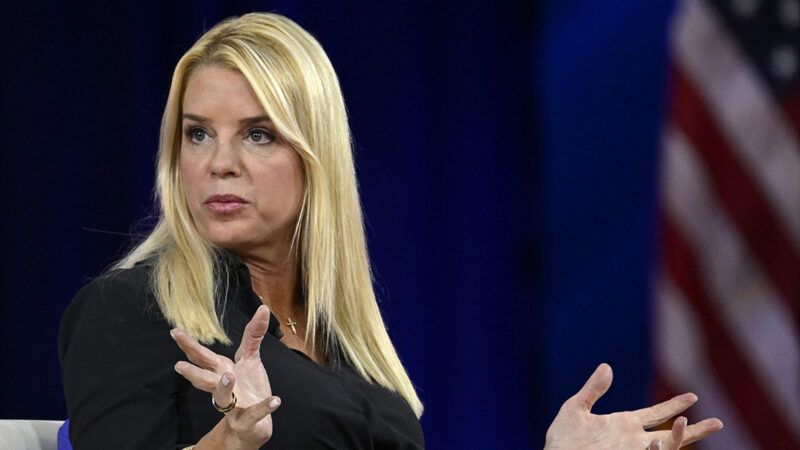Trump Praised His A.G. Pick for Reducing Opioid Overdoses. In Reality, Drug Deaths Surged Under Her Watch.
Pam Bondi cracked down on "pill mills" in Florida. The result was increased consumption of black-market alternatives.

When President Donald Trump announced his nomination of Pam Bondi as attorney general, he extolled her "incredible job" in "work[ing] to stop the trafficking of deadly drugs and reduc[ing] the tragedy of Fentanyl Overdose Deaths." Yet those deaths exploded on Bondi's watch as Florida's attorney general.
According to data from the Florida Department of Health, the age-adjusted rate of "deaths from drug poisoning" did fall a bit after Bondi took office, from 13.7 per 100,000 residents in 2011 to 12.1 in 2013. But then it resumed its upward trajectory, reaching 25.1—nearly double the 2011 rate—by the time Bondi left office in 2019. The death rate rose sharply in 2020 (as it did across the country), rose again in 2021, and declined in 2022 and 2023, when it was 30.8 per 100,000.
In 2019, according to data from the Centers for Disease Control and Prevention (CDC), Florida ranked 20th on the list of states with the highest drug death rates, down from 15th in 2011. But despite that relative improvement, Florida's rate as reported by the CDC rose by 66 percent during that period. In absolute terms, the annual number of drug deaths rose by more than 80 percent.
Bondi's fans praised her for cracking down on "pill mills," which may have made it harder for nonmedical drug consumers (as well as bona fide patients) to obtain prescription opioids such as hydrocodone and oxycodone. But the result was increased consumption of black market alternatives, which are much more dangerous because their quality and potency are highly variable and unpredictable. That hazard was magnified by the simultaneous proliferation of illicit fentanyl as a heroin booster and substitute—a development that likewise was driven by prohibition, which favors more potent drugs that are easier to conceal and smuggle.
The correlation of aggressive drug law enforcement with escalating drug-related deaths is by no means limited to Florida. But Bondi's approach epitomized what went wrong across the country. Nationally, restrictions on pain medication succeeded in reducing opioid prescriptions, which fell by more than half from 2010 to 2022. But that reduction did not slow, let alone reverse, the upward trend in opioid-related deaths, which instead accelerated.
That lesson seems to be lost on Bondi. Fox News reported that her former colleagues in Florida "expect she will bring the same playbook to Washington."
This article originally appeared in print under the headline "Florida Drug Deaths Surged on Pam Bondi's Watch."


Show Comments (47)